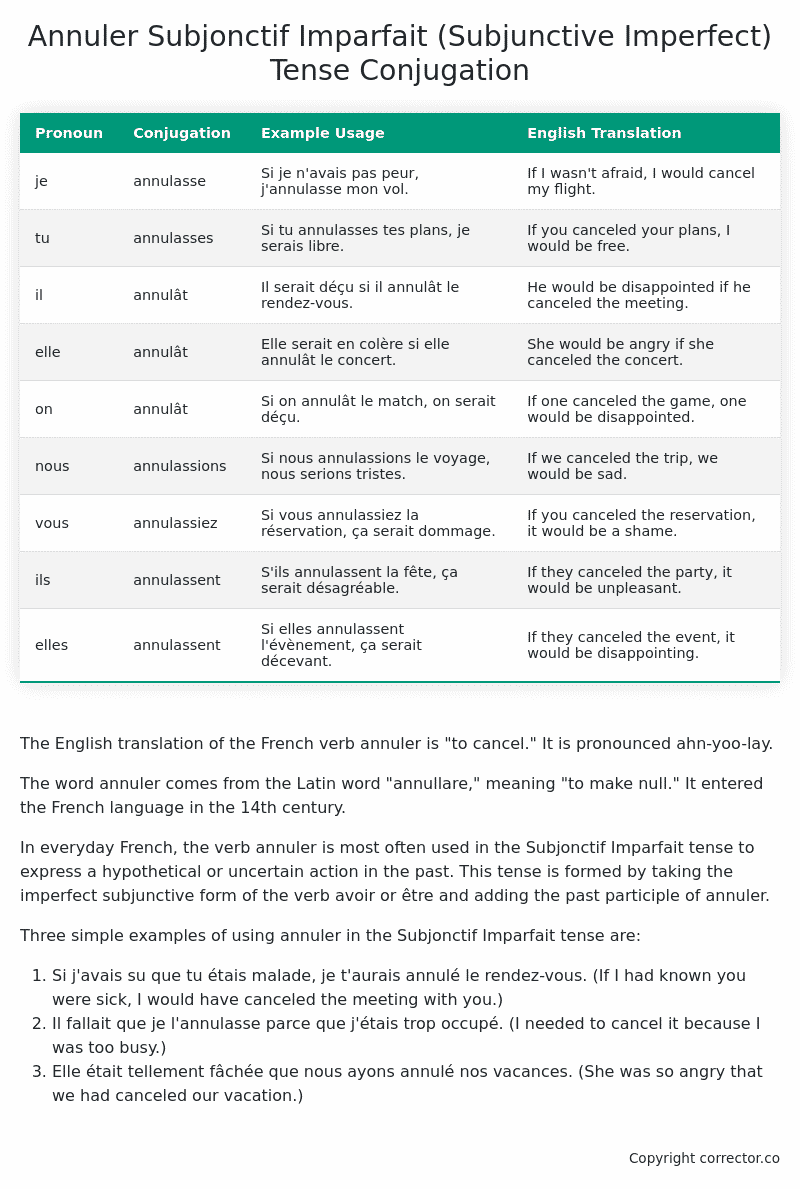Subjonctif Imparfait (Subjunctive Imperfect) Tense Conjugation of the French Verb annuler
Introduction to the verb annuler
The English translation of the French verb annuler is “to cancel.” It is pronounced ahn-yoo-lay.
The word annuler comes from the Latin word “annullare,” meaning “to make null.” It entered the French language in the 14th century.
In everyday French, the verb annuler is most often used in the Subjonctif Imparfait tense to express a hypothetical or uncertain action in the past. This tense is formed by taking the imperfect subjunctive form of the verb avoir or être and adding the past participle of annuler.
Three simple examples of using annuler in the Subjonctif Imparfait tense are:
- Si j’avais su que tu étais malade, je t’aurais annulé le rendez-vous. (If I had known you were sick, I would have canceled the meeting with you.)
- Il fallait que je l’annulasse parce que j’étais trop occupé. (I needed to cancel it because I was too busy.)
- Elle était tellement fâchée que nous ayons annulé nos vacances. (She was so angry that we had canceled our vacation.)
Table of the Subjonctif Imparfait (Subjunctive Imperfect) Tense Conjugation of annuler
| Pronoun | Conjugation | Example Usage | English Translation |
|---|---|---|---|
| je | annulasse | Si je n’avais pas peur, j’annulasse mon vol. | If I wasn’t afraid, I would cancel my flight. |
| tu | annulasses | Si tu annulasses tes plans, je serais libre. | If you canceled your plans, I would be free. |
| il | annulât | Il serait déçu si il annulât le rendez-vous. | He would be disappointed if he canceled the meeting. |
| elle | annulât | Elle serait en colère si elle annulât le concert. | She would be angry if she canceled the concert. |
| on | annulât | Si on annulât le match, on serait déçu. | If one canceled the game, one would be disappointed. |
| nous | annulassions | Si nous annulassions le voyage, nous serions tristes. | If we canceled the trip, we would be sad. |
| vous | annulassiez | Si vous annulassiez la réservation, ça serait dommage. | If you canceled the reservation, it would be a shame. |
| ils | annulassent | S’ils annulassent la fête, ça serait désagréable. | If they canceled the party, it would be unpleasant. |
| elles | annulassent | Si elles annulassent l’évènement, ça serait décevant. | If they canceled the event, it would be disappointing. |
Other Conjugations for Annuler.
Le Present (Present Tense) Conjugation of the French Verb annuler
Imparfait (Imperfect) Tense Conjugation of the French Verb annuler
Passé Simple (Simple Past) Tense Conjugation of the French Verb annuler
Passé Composé (Present Perfect) Tense Conjugation of the French Verb annuler
Futur Simple (Simple Future) Tense Conjugation of the French Verb annuler
Futur Proche (Near Future) Tense Conjugation of the French Verb annuler
Plus-que-parfait (Pluperfect) Tense Conjugation of the French Verb annuler
Passé Antérieur (Past Anterior) Tense Conjugation of the French Verb annuler
Futur Antérieur (Future Anterior) Tense Conjugation of the French Verb annuler
Subjonctif Présent (Subjunctive Present) Tense Conjugation of the French Verb annuler
Subjonctif Passé (Subjunctive Past) Tense Conjugation of the French Verb annuler
Subjonctif Imparfait (Subjunctive Imperfect) Tense Conjugation of the French Verb annuler (this article)
Subjonctif Plus-que-parfait (Subjunctive Pluperfect) Tense Conjugation of the French Verb annuler
Conditionnel Présent (Conditional Present) Tense Conjugation of the French Verb annuler
Conditionnel Passé (Conditional Past) Tense Conjugation of the French Verb annuler
L’impératif Présent (Imperative Present) Tense Conjugation of the French Verb annuler
L’infinitif Présent (Infinitive Present) Tense Conjugation of the French Verb annuler
Struggling with French verbs or the language in general? Why not use our free French Grammar Checker – no registration required!
Get a FREE Download Study Sheet of this Conjugation 🔥
Simply right click the image below, click “save image” and get your free reference for the annuler Subjonctif Imparfait tense conjugation!

Annuler – About the French Subjonctif Imparfait (Subjunctive Imperfect) Tense
Formation
Common Everyday Usage Patterns
Interactions with Other Tenses
Subjonctif Présent
Indicatif Passé Composé
Conditional
Conditional Perfect
Summary
I hope you enjoyed this article on the verb annuler. Still in a learning mood? Check out another TOTALLY random French verb conjugation!


